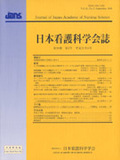Japanese
English
- 販売していません
- Abstract 文献概要
- 参考文献 Reference
- サイト内被引用 Cited by
要旨
日本の腎移植は生体移植が8割を占めるが,ドナーの体験はほとんどわかっていない.本研究は,わが国の生体腎移植ドナーの腎提供の体験を明らかにすることを目的とした.都内大学病院で内視鏡下腎提供を行い外来通院しているドナー15名を対象に半構成面接を行い,グラウンデッド・セオリー・アプローチで分析した.
結果,コアカテゴリー『「自分しかいない」ことの確認とその意味の深まり』を見出した.レシピエントが健康な頃,遠い世界だった移植は,腎障害の共有,移植情報の獲得,医師の勧めにより自分の問題になった.自分自身と向き合い,おかれている状況,選択肢を考慮し,自分しかいないことを確認し提供に進むが,提供の意思とは別に術直前まで心が揺れていた.
術後には変化が3つ生じた.患者と家族の2つの役割をもつこと,レシピエントへの新たな認識をもつこと,レシピエントの回復過程に影響を受けながら腎提供の意味づけをすることである.ドナーは提供後も自分しかいないことの意味を深めていることが明らかになった.
以上より,腎提供はドナーの新たな自己概念を再構築する体験と考えられた.
Abstract
In Japan, the donation of kidney for transplantation from the living donor occupies about 80% of kidney transplant. However the experiences of living kidney donors are little understood. Semi-structured interviews were conducted to illuminate the experiences of living kidney donors. Subjects were 15 donor-patients who were discharged from hospital shortly after donating their kidney using laparoscopy at university hospital in Tokyo.
A new core category was discovered using the grounded theory approach. It was the confirmation that one was irreplaceable as a donor, which deeply influenced their life even after the donation. When recipients were healthy, they regarded organ transplantation as a somewhat unrealistic issue. However, through sharing knowledge of the recipients' renal failure, obtaining medical information on renal transplantation, and hearing the recommendations of physicians, the issue became the donors own. The donors looked within themselves, tried to understand the situation that they were in and gave thought to other choices. Finally they underwent the operation in confirmation of the fact that each was irreplaceable as a donor, though they also experienced anxiety, fear, doubt, and other conflicts. Their minds certainly wavered, though the degree varied.
The donors also experienced 3 changes immediately following the donation:They felt that they had played the role of a family member to the recipients as well as donor-patients;they experienced a new understanding of the recipient;and they discovered a new understanding of kidney donation through observing the recipient's recovery process. Thus, the donors defined the meaning of the fact that they were irreplaceable as a donor even after the donation.
The findings demonstrated that kidney donation could be an experience to re-create a new realization of donor's self-concept.
Copyright © 2009, Japan Academy of Nursing Science. All rights reserved.


